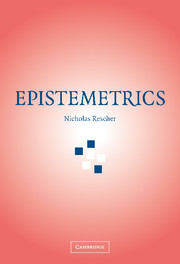Book contents
- Frontmatter
- Contents
- Preface
- 1 Asking for More Than Truth: Duhem's Law of Cognitive Complementarity
- 2 Kant's Conception of Knowledge as Systematized Information
- 3 Spencer's Law of Cognitive Development
- 4 Gibbon's Law of Logarithmic Returns
- 5 Adams's Thesis on Exponential Growth
- 6 Quality Retardation
- 7 How Much Can Be Known? A Leibnizian Perspective on the Quantitative Discrepancy Between Linguistic Truth and Objective Fact
- 8 On the Limits of Knowledge: A Kantian Perspective on Cognitive Finitude
- Conclusion
- Bibliography
- Index of Names
4 - Gibbon's Law of Logarithmic Returns
Published online by Cambridge University Press: 06 August 2009
- Frontmatter
- Contents
- Preface
- 1 Asking for More Than Truth: Duhem's Law of Cognitive Complementarity
- 2 Kant's Conception of Knowledge as Systematized Information
- 3 Spencer's Law of Cognitive Development
- 4 Gibbon's Law of Logarithmic Returns
- 5 Adams's Thesis on Exponential Growth
- 6 Quality Retardation
- 7 How Much Can Be Known? A Leibnizian Perspective on the Quantitative Discrepancy Between Linguistic Truth and Objective Fact
- 8 On the Limits of Knowledge: A Kantian Perspective on Cognitive Finitude
- Conclusion
- Bibliography
- Index of Names
Summary
(1) Cognitive progress is subject to Kant's Principle of Question propagation to the effect that new knowledge always brings new questions in its wake. (2) However, the increase of mere information does not yield a corresponding increase in knowledge: knowledge is not proportional to the volume of information, but only to its logarithm. This key epistemological principle traces back at least to Edward Gibbon. (3) Gibbon's Law of Logarithmic Returns as a principle of the realm of conception parallels the Weber-Fechner Law in the epistemics of perception. (4) The Law of Logarithmic Returns accounts for Max Planck's Thesis that scientific progress becomes ever more difficult, so that diminishing returns on effort are an unavoidable facet of inquiry.
Kant's Principle of Questions Propagation
New knowledge that emerges from the progress of inquiry can bear very differently on the matter of questions. Specifically, we can discover
New (that is, different) answers to old questions.
New questions.
The inappropriateness or illegitimacy of our old questions.
With (1) we learn that the wrong answer has been given to an old question: we uncover an error of commission in our previous question-answering endeavors. With (2) we discover that there are certain questions that have not heretofore been posed at all: we uncover an error of omission in our former question-asking endeavors. Finally, with (3) we find that we have asked the wrong question altogether: we uncover an error of commission in our former question-asking endeavors, which are now seen to rest on incorrect presuppositions (and are thus generally bound up with type [1] discoveries).
- Type
- Chapter
- Information
- Epistemetrics , pp. 29 - 44Publisher: Cambridge University PressPrint publication year: 2006



